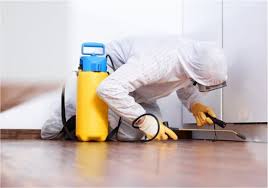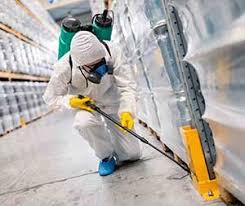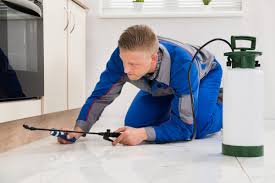Pest Control vs. Exterminators … What’s the difference?
What exactly is an exterminator and how does it differ from a pest management professional? Years ago your parents may have been quick to pick up the phone and say “I need these ants exterminated now!” The response was a very chemically invasive treatment that required them to be out of the house for hours, which during that time chemicals were pumped into the walls and the home was “bombed.” In the end, sometimes the treatments worked, but often they didn’t. Even when it worked, the ants often returned because the chemical treatment was just a Band-Aid and not a real solution.
For the longest time, and even still today, the thrill of the kill is what some people want to see when it comes to dealing with unwanted pests. They want to walk into a room that was treated aggressively with chemicals and see a massacre of dead cockroaches belly-up all over the floor. Homeowners may envision a terminator with a backpack filled with chemicals using the spray hose to spray chemicals throughout a home and then watch the bugs falling from the ceiling. That scene is what homeowners envisioned when dealing with various pests in their home.
The definition of exterminate is to “destroy completely,” also associated with the words “kill,” “put to death,” “erase from existence,” etc., hence why the imaginary scene of exterminators seems so profound with homeowners. While the word may suggest eradication of a pest population, rarely does this occur, which is fortunate for all of us because even pests play an important role in the environment and our planet’s ecology. Still we don’t want to see unwanted bugs and critters in our homes either because they have the ability to bite or sting us, can cause disease, damage our homes or belongings, or simply just be upsetting to see. This is where professional pest management comes into play. Pest problems must be managed in a way that keeps them out of our homes while protecting the environment, both inside our homes and in nature.
Exterminators and pest management professionals have several differences, although their goal of eliminating the pests may be similar. Exterminators rely on pesticides to eliminate the unwanted pests, using chemicals that could be more toxic than necessary whereas a pest control professional will focus on why the pests are present and look to alter the conditions that attracted them in the first place. If chemicals become necessary, the pest management professional will use more environmentally friendly products to get rid of the pests. Pest control companies tend to use products that are just as effective on the bugs but have little odor, are much less toxic to humans and pets and are applied in a very targeted fashion. Some treatments even completely eliminate the use of pesticides. The biggest difference is that pest management professionals look for long-term solutions, rather than simply spraying chemicals to kill the pests you see.

Do it Yourself Pest Control VS. Professional Pest Control
In the recent years of the down economy, we have witnessed more people resorting to a do it yourself method of getting rid of bugs. There are certain situations where we agree that do it yourself is a good alternative to hiring an exterminator. If you spot a single bug such as a fly, yellow jacket, or ant, there is usually no need for a professional pest control company to come to your home. But if you spot a termite, a bed bug, or any other insect that can cause damage to your family or your home, it is necessary to call an exterminator.
There are certain things that need to be considered when deciding to DIY or hire a professional:
Expense
DIY – A trip to the store and the purchase of chemicals is typically less expensive than hiring a pest control company.
Professional – Although the initial investment is more expensive with a professional, it may end up being the cheaper alternative. If the in store pesticides are not effective they may result in the growth of your pest control problem. Continuing to buy in store products can get expensive. Not to mention the potential damage to your home that pests can cause.
Convenience
DIY – When doing it yourself, you can go to the store, purchase the pest control product, and apply it at your own convenience.
Professional – It can be a pain to find a time that is convenient for both you and your exterminator to meet at your home for a treatment. More often than not, this is at the inconvenience of the customer. However, a good exterminator will work with the homeowner to schedule the best time for them.
Knowledge
DIY – The instructions are on the label. Not only can information be found on the label but it is very easy to go to the internet and do a research on the particular product or insect. Be sure that all instructions are followed exactly as listed on the package.
Professional – An experienced and knowledgeable exterminator will be able to quickly identify and treat your problem. They are also able to answer any questions that you have about prevention or other issues that you are experiencing. Their experience and expertise can keep your home and family healthier than just reading the instructions on a label.
Risk
DIY – Chemicals of any kind can carry a risk. Applying chemicals that you are not knowledgeable about could potentially cause harm to humans, pets, or plants in the area. This is not to scare you but to remind you that we cannot stress enough the importance to read all instructions and follow all directions listed on the product label.
Professionals – By hiring an experienced and knowledgeable pest control company, most risk is removed from the homeowner. Be sure to read all contracts and get reviews from past customers before hiring a pest control company.

What is bug repellent for the home?
There is nothing worse than having an insect infestation. But before you call your local exterminator, a quality bug spray may be all that you need to terminate the problem and go to sleep soundly again. An effective bug spray will help kill bugs and insect eggs in and around your home, and prevent any future insects from visiting your property. All you need to do is spray the repellent in and around your home and allow the area to dry before children and pets re-enter.

Preparing a Room for Bed Bug Treatment
Before you begin your own bed bug treatment, you will need to prepare the room or rooms where bed bugs have been found, in addition to rooms that share walls with the infested rooms. Remove any items in the room that you absolutely cannot treat or that have already been treated. Cover items that will be removed from the room in plastic bags before moving to the next room to prevent any unseen bed bug from infesting another room.
Remove any paintings or art from the walls. Be sure to thoroughly check any item that is removed from the room to prevent bed bugs from being transferred from room to room.
If you have a mattress that is heavily infested, we recommend covering it with a bed bug proof mattress cover or bed bug mattress encasement before moving. You will also need to cover your box spring with a box spring encasement.
If your mattress needs to be disposed of and replaced, be sure to cover the mattress with plastic before disposing to protect sanitation workers. Labeling a mattress or covering with “Bed Bugs” is also helpful.
Infested sheets, linens, and garments should be washed and then dried in a household dryer on high heat (over 120 degrees F), as the heat will kill bed bugs. Any garments that cannot be washed may need to be dry-cleaned or discarded as insecticides cannot be used on these materials.
If stuffed animals, books, or soft toys are infested, place those items in an air-tight bin along with vapor strips to kill the bed bugs.
How pest control works
Pest control is really a science. All of our technicians are trained and certified in this science so your home will be bug-free. In order to get your home to the tip-top shape that we want it to be in, we have to work with that science. Some bugs respond to treatments differently, which is why we always use multiple pesticides tailored to the specific bugs that you’re seeing.
Our pesticide works to draw bugs away from the home so that they never get inside. However, with the first treatment, we will also treat inside to kill off any egg sacs that may be lying around and any bugs that are still alive. Usually, this is all that’s needed to prevent bugs from coming into the home. With some bugs, like ants, we have to use a bait to kill off the colony. They eat the bait and take it back with them, so it can take a few days for them to die off.
In addition to our inside and outside spray and our ant bait, we also use granules in the yard. These granules kill off any bugs in the yard that may be messing with your grass. This also includes ant piles, which can be large colonies that eventually get into the home.
Bugs can be hard to kill because they have a thick exoskeleton that protects their bodies, which is why multiple pesticides are used to repel, kill, and prevent the bugs from getting near the home.